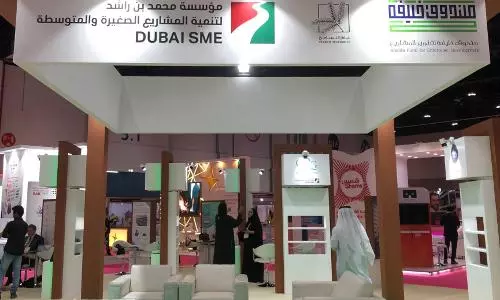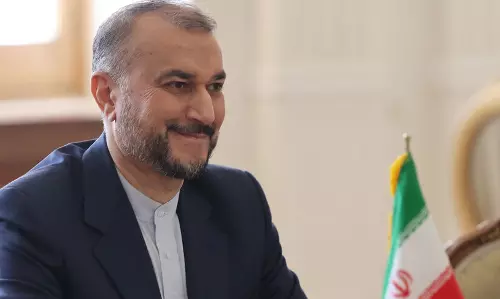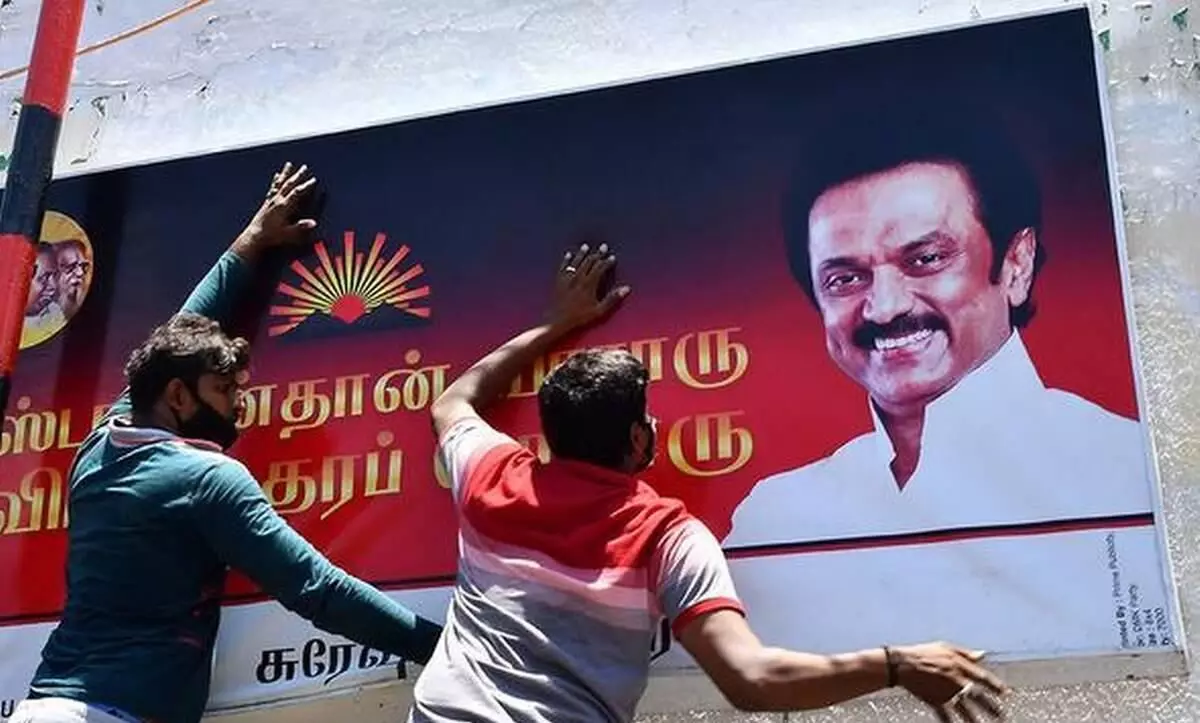
Squarely challenging 'Hindi-Hindu-Hindustan' and urging compassion towards people's suffering
text_fieldsRepresentative Image ( M K Stalin )
It's just one and a half months since the DMK government has come to power in Tamil Nadu, and the Centre is already reeling under the logical clarity of the issues raised by M K Stalin and his team of DMK ministers. The new Chief Minister plunged straight into matters of governance from Day 1 of assuming office, marking the extraordinary challenges posed by the pandemic as his government's highest priority. He signed five pandemic relief orders in five minutes of assuming oath, distributing cash aid and discounts to ration-card holders.
The CM set the more media-savvy youngsters among his team of ministers to talk on behalf of the government, such as the quirky finance minister Palanivel Thiagarajan (PTR). It should be noted that in 2020, when the Centre passed the Rs 20 lakh crore package post lockdown to lift the Indian economy, Stalin had stated that at least in the context of the pandemic, the Centre should give direct financial support to daily wage earners, roadside traders, poor people and guest workers instead of acting as a "money lender" and providing loans.
The coming to power of DMK has raised unprecedented and vexatious problems for Modi. Perhaps for the first time in his political career, Narendra Modi faces such open irreverence as when PTR calls him out on lack of fairness in the redistribution of GST revenue among the states and lack of compassion in matters of pricing of Covid vaccines. In an interview given to NewsMinute after the Centre had made the reluctant compromise of procuring 75 per cent of the vaccine to give to the states, PTR stated that the vaccine was not a niche or luxury good, and the Centre should in fact procure 100% of the vaccines. The fearless and sophisticated charm of PTR in hitting the nail right on its head shows that the days of casual remote-controlling of Tamil Nadu's governance by the Centre, as happened during AIADMK rule, is passe.
PTR's scathing critique of the GST mess has to be understood against this backdrop. Apart from plugging the holes in collecting taxes from the wealthy segment in the state, PTR comes straight to the economic-cum-political discrepancies within the GST Council. He doesn't mince words when he says that revenue from excessive GST taxation from prosperous states such as TN is being pumped into the central pool, and a huge share of the central revenue is being diverted into NDA-ruled states UP and Bihar. In contrast, TN's revenue from the Centre has been steadily falling over the years.
The new DMK government thus makes it politically amply clear why it chooses to address the Modi government as 'Ondriya Arasu' (Union of States), an unequivocal departure from the earlier preferred 'Mathiya Arasu' (central government), reminding everyone that India is a federal 'union of states'.
The BJP cannot seem to wrap its head around the multiple facets of what has been known as Tamil exceptionalism. The BJP's highhanded pushing of the RSS ideology of 'Hindi-Hindu-Hindustan' seems to have met its match in DMK's Dravidian politics. If the Brahminical RSS ideology is 100 years old, the anti-Brahmin movement in TN is more than 100 years old, and the sense of Tamil pride in their language and civilization dates back to BCE. In a 90 per cent Hindu majority state like TN, the BJP grudgingly had to swallow the lesson that votes could not be won by arousing communal passions uniformly across India. Even the BJP's battle for the Brahminical control of Tamil Nadu's temples is a lost cause in TN.
In no other state, including Kerala, would a minister have had the political gumption to call a godman with such an international following and the patronage of the central government as Jaggi Vasudev a "commercial operator" and a "publicity hound". The fundamentals of the Dravidian ideology were evident in the DMK government's three extremely potent orders brought out last week. DMK's Minister for Hindu Religious and Charitable Endowments PK Sekhar Babu announced the replacement of Sanskrit with Tamil as the language for prayer in TN temples, the appointment of around 200 non-Brahmin priests in the temples of Tamil Nadu in the first 100 days of the DMK government and the appointment of women as pujaris in temples across the state, subverting at a single stroke the linguistic, casteist and gender hierarchies inherent in the Sangh Parivar ideology.
MK Stalin met PM Modi this Thursday and submitted a memorandum with 25 demands. These included the scrapping of BJP's pet projects such as CAA, the Farm Bills and the New Education Policy. The BJP seems to have at last met its match. Against the backdrop of the bonhomie shared by the CMs of Kerala and TN, the two states should form a bulwark of a progressive, secular southern challenge to Hindutva. Most of the people in both the states share an intense revulsion at the medievalism prevalent in the country and a commitment to pluralism, secularism, compassion, democracy and communal amity.
(Leena Mariam Koshy is a freelance journalist based in Kozhikode)


















